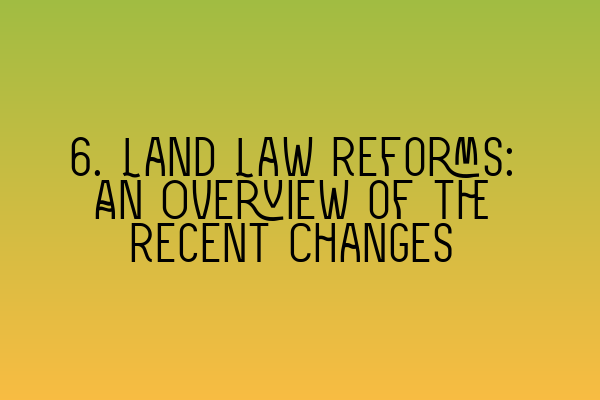6. Land Law Reforms: An Overview of the Recent Changes
Welcome to SQE Property Law & Land Law, where we provide expert legal services and help you stay informed about the latest developments in land law. In this blog post, we will take a comprehensive look at the recent land law reforms in the UK. Whether you are a property owner, a tenant, or a legal professional, understanding these changes is essential to stay up to date with the evolving legal landscape.
1. Introduction to Land Law Reforms
Land law in the UK has undergone significant changes in recent years, with the aim of modernizing and simplifying the legal framework governing property ownership, transactions, and disputes. These reforms have been introduced to address various challenges faced by property owners, such as unclear rights, complex legal processes, and lengthy litigation.
As a result of these reforms, the law has become more accessible, transparent, and user-friendly. It is crucial for professionals working in the field of property law to familiarize themselves with these changes, as they impact their practice and clients.
2. Key Changes in Land Law
Let’s delve into some of the key reforms that have taken place in land law:
a) Land Registration System
The land registration system has undergone significant modernization, making it more efficient and secure. The Land Registry, responsible for maintaining registers of ownership, interests, and rights in land, has introduced digital services and online portals to streamline registration processes. It is now easier to search, transfer, and update land ownership records.
The introduction of electronic conveyancing has also expedited property transactions by eliminating the need for paper-based documentation and physical presence at the Land Registry.
Check out our SQE 1 Practice Exam Questions to further test your knowledge on the land registration system.
b) Restrictive Covenants
The law surrounding restrictive covenants has been reformed to strike a balance between protecting the legitimate interests of landowners and promoting development. The courts now have greater flexibility in interpreting and modifying restrictive covenants to ensure fairness and avoid undue restrictions on development.
c) Leasehold Reforms
The leasehold system has undergone significant reforms to address issues such as onerous ground rents, unfair leasehold terms, and excessive charges. The government has introduced measures to protect leaseholders’ rights, promote transparency, and provide a pathway for leaseholders to own their properties outright.
If you’re interested in leasehold reforms, take a look at our SQE 1 Practice Mocks FLK1 FLK2 to enhance your understanding.
d) Electronic Signatures
The use of electronic signatures in property transactions has been recognized and accepted as valid. This change allows parties to sign and exchange documents electronically, reducing paperwork and expediting the conveyancing process.
e) Easements and Rights of Way
There have been reforms in the law regarding easements and rights of way, clarifying the rights and obligations of landowners. The Supreme Court has provided guidance on the scope and enforceability of these rights, ensuring more certainty and consistency in their application.
To dive deeper into easements and rights of way, explore our SQE 2 Preparation Courses.
f) Commercial Property Law
Commercial property law has seen reforms, particularly in relation to leases and rent arrears. The COVID-19 pandemic has necessitated temporary measures and legislative changes to protect businesses and tenants affected by rent arrears due to the economic fallout caused by the pandemic.
For a comprehensive understanding of commercial property law, consider our SQE 1 Preparation Courses.
3. Implications and Benefits of the Reforms
These reforms have several implications and benefits:
- Enhanced accessibility and transparency in land transactions
- Simplified legal processes, reducing bureaucracy and delays
- Clarity in interpreting and enforcing property rights
- Protection of the interests of property owners and tenants
- Facilitation of economic development and investment
By staying informed about these reforms, legal professionals can better advise their clients and ensure smooth and efficient property transactions.
4. How to Stay Up to Date with Land Law Reforms
As land law continues to evolve, it is essential to stay up to date with the latest developments. Here are some ways to keep yourself informed:
- Regularly review updates from legal publications and reputable websites
- Participate in relevant professional development courses and seminars
- Engage with industry associations and networks
- Join online forums and communities to exchange knowledge and insights
If you’re preparing for the SQE exams, remember to check the SRA SQE Exam Dates to plan your study schedule effectively.
In conclusion, the recent land law reforms have brought about significant changes in the legal framework governing property ownership and transactions. As legal professionals, it is our responsibility to understand and adapt to these reforms to best serve our clients and navigate the evolving legal landscape successfully.
For more articles and resources on property law and land law, remember to visit our website regularly.
